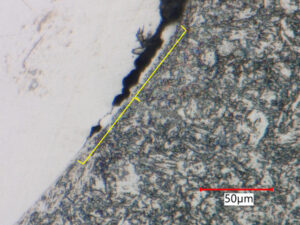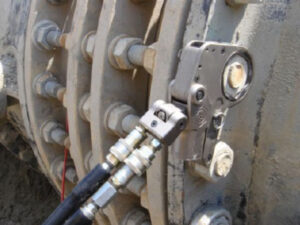- Home
- Engineering
- Materials & Corrosion
- Failure Analysis & Root Cause Failure Analysis
Failure Analysis & Root Cause Failure Analysis
Develop Practical Mitigation Strategies After a Failure or Loss of Containment
There’s been an equipment failure or loss of containment at your plant. You need answers and you need them quickly. You need a team who can provide immediate answers, outline practical recommendations, and offer corrective solutions.
Our Materials & Corrosion team has decades of plant experience and access to state-of-the-art laboratory equipment to help get your facility back up to full operation quickly and safely. You can ship us the failed component for laboratory analysis and damage mechanism assessment (performed remotely) with turnaround as quick as next day for some tests. Or, we can come to your facility to help identify the appropriate samples, troubleshoot, and aid in the investigation. Our team is equipped to rapidly mobilize; we can arrive on site within 24 hours, if not sooner.
Failure Analysis
A failure analysis or metallurgical analysis helps you understand what happened or what could happen in the future.
During a failure analysis, our team will identify the damage mechanisms responsible for the failure of a piece of equipment, loss of containment, or the material degradation of near miss.
Outcome: Our team conducts Level 1 and Level 2 (API RP 585) failure analyses that include lab investigation, tests, and microscopy to understand the damage mechanisms.
We identify the material properties, damage progression rate, and proper remediation strategies, all important factors for fitness-for-service (FFS) assessments and incident investigations.
Root Cause Failure Analysis (RCFA)
An RCFA is a process to identify the most basic cause of a particular failure and use that information to develop practical corrective or mitigation strategies. Using an experienced materials and corrosion engineer to conduct the RCFA is critical to ensuring a quick and accurate conclusion.
Outcome: An RCFA is a rigorous, formal Level 3 (API RP 585) incident investigation. The results are typically related to organizational culture, management, and procedures.
The goal is to identify the physical and immediate causes (metallurgical), root cause (procedural), and contributing causes (what made failure worse).
How Does a Failure Analysis Impact an FFS Assessment?
Understanding the root cause of a failure is important to determining the remaining life of your equipment or assets. Our team will help identify the material properties, damage progression rate, and proper remediation strategies to ensure the safe and reliable operation of your equipment. You will be armed with detailed information to help you make informed maintenance decisions regarding the run, repair, or replace plan of your equipment or components.

Failure or Incident Analysis
Equity offers a comprehensive failure analysis workflow when there has been an equipment failure, loss of containment, or damage found during a routine inspection. We have access to state-of-the-art analytical laboratory equipment that allows our team of metallurgical and corrosion experts to conduct in-depth engineering analyses and deliver recommendations to solve the problem.
Use or “scoop” samples to identify high-temperature hydrogen attack (HTHA).
Develop “custom” minimum pressurization temperature (MPT) envelopes and perform critical flaw sizing to mitigate the risk of in-service cracking failures.
Perform creep damage characterization and Omega creep testing.
Quantify the impact of thermal runaway or upset events.
Distinguish fabrication defects from fatigue damage or other types of in-service cracking.
Offer damage mitigation solutions for all relevant damage mechanisms and estimate equipment remaining life.
Perform detailed laboratory analysis and metallography to identify the cause of failure.
Case Study: Metallurgical Failure Analysis
- Issue: The failure of a complex brazed aluminum heat exchanger (BAHX) resulted in a loss of containment and significant downtime at the terminal. The client was uncertain about what caused the failure and what the risk levels were for potential failures in similar equipment.
- Solution: Equity provided immediate on-site support to help the company’s internal investigation into the failure. While on site, we collected samples for a metallurgical analysis and performed an expedited failure analysis. The root cause failure analysis confirmed the suspected cause of failure – thermal fatigue along with other damage mechanisms observed but not immediately responsible for the failure. As a result, we identified fabrication practices, operating modes, and past repairs which also played a significant role in the failure.
- Result: In addition to the failure analysis, Equity developed an engineering practice for the client to mitigate similar failures. Based on the robust engineering practices, the client realized increased reliability in the operation of the BAHX equipment and increased confidence in similar equipment at other facilities.
Recommended Reading
- Corrosion /
- Damage Mechanisms /
- Fertilizer /
- Library /
- Materials & Corrosion /
- Library /
- Materials & Corrosion /
- Industry Insights Articles /
- Materials & Corrosion /
Failure & Incident Investigation Expertise
Equity combines experts with decades of plant experience with access to state-of-the-art analytical laboratory equipment to provide immediate answers to the cause of failures as well as practical recommendations and corrective answers. We are available to arrive on site within 24 hours to help facilitate incident or fire damage investigations, as part of a formal root cause failure analysis (RCFA) or API 585 type protocol.
Our experts:
- Have 350+ years of combined field experience
- Pioneered development of FFS and RBI
- Are the primary authors on WRC 528 and WRC 562
- Serve as lead investigators on API 579 and API 571
- Provide emergency on-site support within 24 hours





